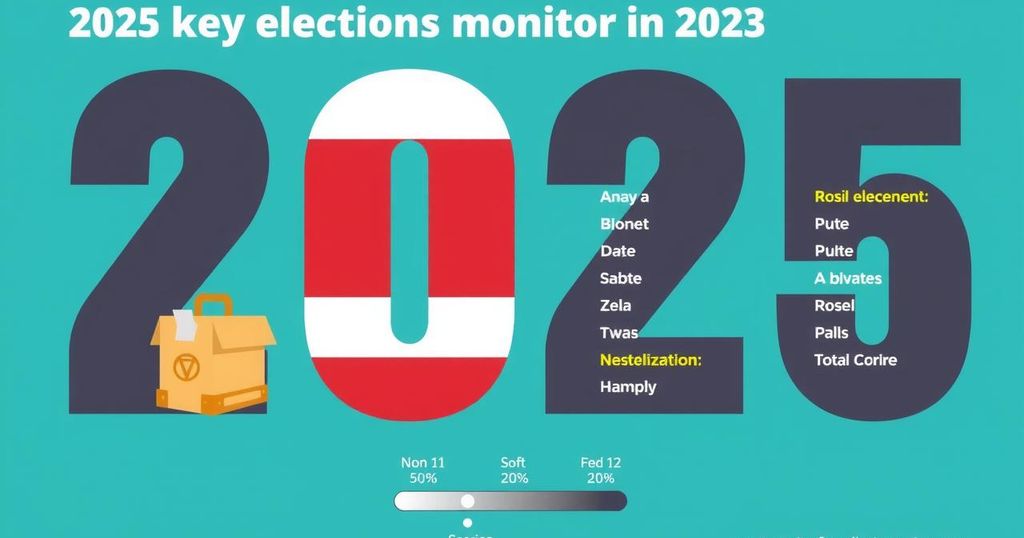In 2025, significant elections in Belarus, Germany, the Philippines, Canada, and Chile are set to shape the global political landscape. Each nation contends with unique challenges, including authoritarianism, economic turmoil, and political instability. Experts highlight the implications of these elections on governance and possible shifts in political ideologies, with outcomes likely affecting both local and international affairs.
As we look ahead to 2025, several key elections are poised to shape the political landscape across the globe. Although the election cycle may not reach the intensive scale of 2024, nations such as Belarus, Germany, the Philippines, Canada, and Chile will each hold significant elections that reflect deep-seated political and economic challenges. Experts from various academic institutions have offered insights into these elections, emphasizing critical themes including government stability, economic turmoil, and the enduring impact of populism and authoritarianism.
In Belarus, President Alexander Lukashenko is expected to secure re-election on January 26, 2025, marking his seventh term. His regime continues to repress dissent, with no credible opposition likely to contest the vote. The current political climate, characterized by severe restrictions on civil liberties and ongoing political repression, suggests that if Lukashenko maintains power, Belarus will persist as a staunch ally of Russia amid regional geopolitical tensions.
Germany will undergo its federal elections on February 23, 2025, earlier than scheduled due to the collapse of Chancellor Olaf Scholz’s coalition government. Confronted with internal strife over budget management and European crises, Scholz faces dwindling support as economic challenges compound. With rising contenders such as Friedrich Merz of the Christian Democratic Union poised to challenge Scholz’s tenure, the elections could usher in a shift in Germany’s political direction and governance priorities.
The Philippines will conduct midterm elections on May 12, 2025, where 12 senatorial positions are up for grabs. The elections are often perceived as a referendum on the sitting president, Ferdinand Marcos Jr., who faces the political complexities of managing an alleged rift with Vice President Sara Duterte. A predictable outcome is anticipated, often leaning in favor of candidates backed by the president, reinforcing Marcos’s control over the political framework.
In Canada, an election is expected before October 20, 2025, amidst the potential collapse of Prime Minister Justin Trudeau’s fragile coalition. With Trudeau lagging in polls and experiencing internal dissent, his leadership is under scrutiny amid economic challenges and external pressures from the United States. The Conservative Party, led by Pierre Poilievre, may seize this opportunity to advocate for a shift in government policies.
Finally, Chile will hold its presidential elections on November 16, 2025, with a runoff likely to occur a month later. With incumbent President Gabriel Boric unable to seek a second consecutive term, the left-wing coalition has grappled with inadequate parliamentary majority and major public discontent. Chile has emerged from a tumultuous period that saw two rejected constitutional proposals, and the political climate remains uncertain as competing parties prepare for significant changes.
The article examines five pivotal elections occurring in 2025 that have significant implications on both national and international levels. Each country highlighted—Belarus, Germany, the Philippines, Canada, and Chile—is facing unique political and economic challenges that could drastically influence governance and public policy. The insights provided by experts underscore how themes such as inflation, populism, and political repression are intricately woven into the upcoming electoral processes in these diverse regions, reflecting broader global trends.
The 2025 elections in Belarus, Germany, the Philippines, Canada, and Chile promise to be highly consequential, reflecting each country’s internal challenges as well as broader geopolitical dynamics. As authoritarianism persists in Belarus, and economic hardships weigh heavily on the electorate in Germany and Canada, the outcomes could redefine political alliances and governance in their respective regions. Meanwhile, the Philippines and Chile provide pertinent examples of how local leadership struggles can shape long-term national objectives. These elections warrant close attention as they may set the tone for the political atmosphere in the years to come.
Original Source: cobbcountycourier.com






